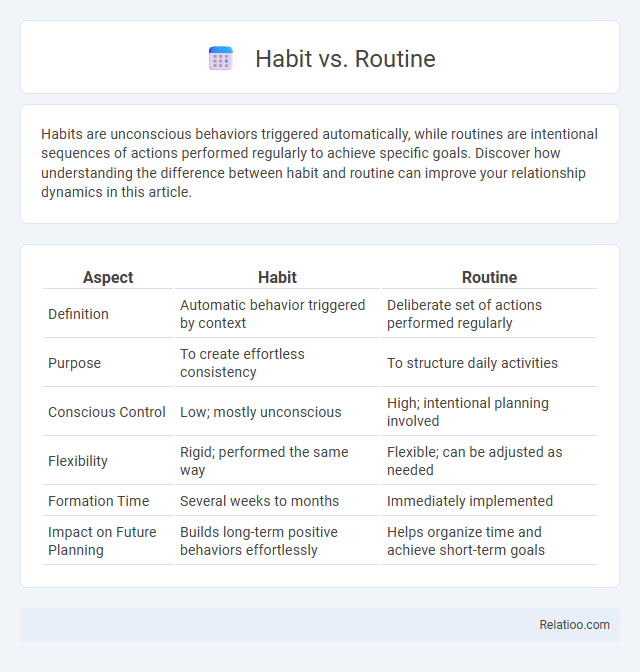Habits are unconscious behaviors triggered automatically, while routines are intentional sequences of actions performed regularly to achieve specific goals. Discover how understanding the difference between habit and routine can improve your relationship dynamics in this article.
Table of Comparison
| Aspect | Habit | Routine |
|---|---|---|
| Definition | Automatic behavior triggered by context | Deliberate set of actions performed regularly |
| Purpose | To create effortless consistency | To structure daily activities |
| Conscious Control | Low; mostly unconscious | High; intentional planning involved |
| Flexibility | Rigid; performed the same way | Flexible; can be adjusted as needed |
| Formation Time | Several weeks to months | Immediately implemented |
| Impact on Future Planning | Builds long-term positive behaviors effortlessly | Helps organize time and achieve short-term goals |
Understanding Habits and Routines
Habits are automatic behaviors triggered by specific cues, requiring minimal conscious effort, while routines are deliberately structured sequences of actions aimed at achieving particular goals. Understanding habits involves recognizing the cue-routine-reward loop that reinforces behavior, whereas routines emphasize intentional planning and consistency over time. Distinguishing between habits and routines helps optimize personal productivity and behavior change strategies.
Key Differences Between Habits and Routines
Habits are automatic behaviors triggered by specific cues, requiring little conscious thought, whereas routines are deliberate sequences of actions performed regularly to achieve a goal. Your habits develop through repetition and become ingrained over time, while routines are flexible and can be adjusted based on your needs or circumstances. Understanding these distinctions helps you design effective daily practices that enhance productivity and well-being.
How Habits Are Formed
Habits are formed through the process of consistent repetition of specific behaviors triggered by cues in the environment, leading to automatic responses without conscious effort. Neuroscientific studies show that the basal ganglia play a crucial role in habit formation by storing patterns and allowing these actions to become ingrained over time. Unlike routines, which require deliberate planning and adjustment, habits operate subconsciously and are reinforced by rewards that strengthen neural pathways, making behavior more efficient and resistant to change.
The Science Behind Routines
Routines are structured sequences of actions that your brain automates to conserve cognitive energy, as supported by research in neuroscience and psychology. Habit formation involves neural pathways strengthening through repetition, making behaviors automatic and requiring less conscious effort. Understanding the science behind routines enables you to design efficient daily patterns that promote productivity and well-being by leveraging habit loop mechanisms and executive function optimization.
Benefits of Building Good Habits
Building good habits enhances productivity, strengthens discipline, and promotes long-term well-being by automating positive behaviors. Unlike routines, habits require less conscious effort, enabling consistent progress toward personal and professional goals. Establishing habits rooted in mindfulness and health can reduce stress, improve focus, and create lasting positive change in daily life.
Creating Effective Daily Routines
Creating effective daily routines involves differentiating between habits and routines: habits are automatic behaviors triggered by specific cues, while routines consist of a series of intentional actions aimed at achieving particular goals. You can enhance productivity and well-being by designing routines that incorporate positive habits, such as morning exercise or focused work sessions, ensuring consistency and reinforcing desired behaviors. Leveraging habit stacking and time-blocking strategies optimizes routine formation, making daily tasks more manageable and sustainable.
Habit vs Routine: Which Drives Success?
Habits are automatic behaviors triggered by cues, while routines are deliberate sequences of actions often requiring conscious effort. Your success is more influenced by habits because they create consistent, effortless patterns that shape long-term outcomes without constant decision-making. Understanding the power of habit formation helps transform intentional routines into sustainable success drivers.
Common Mistakes in Developing Habits and Routines
Confusing habits, routines, and rituals often leads to inconsistent behavior change, as habits are automatic actions triggered by cues, routines are deliberate sequences of activities, and rituals carry symbolic meaning. You may mistakenly rely too heavily on willpower to form habits without addressing environmental cues, resulting in frequent lapses. Overcomplicating routines or failing to track progress undermines habit stability and long-term adherence.
Strategies to Transform Routines into Habits
Transforming routines into habits requires consistent repetition and environmental cues to reinforce behavior automatically. Strategies include setting specific triggers, simplifying tasks, and rewarding progress to strengthen the habit loop. Tracking progress and adjusting routines based on feedback enhances long-term habit formation and sustainability.
Sustainable Change: Blending Habits with Routines
Sustainable change thrives when you blend habits with routines, creating a seamless system that supports long-term goals. Habits are automatic behaviors triggered by cues, while routines are structured sequences of actions you consciously follow. Integrating both enables consistent progress by embedding desired behaviors within daily patterns, reducing effort and enhancing perseverance.

Infographic: Habit vs Routine
 relatioo.com
relatioo.com